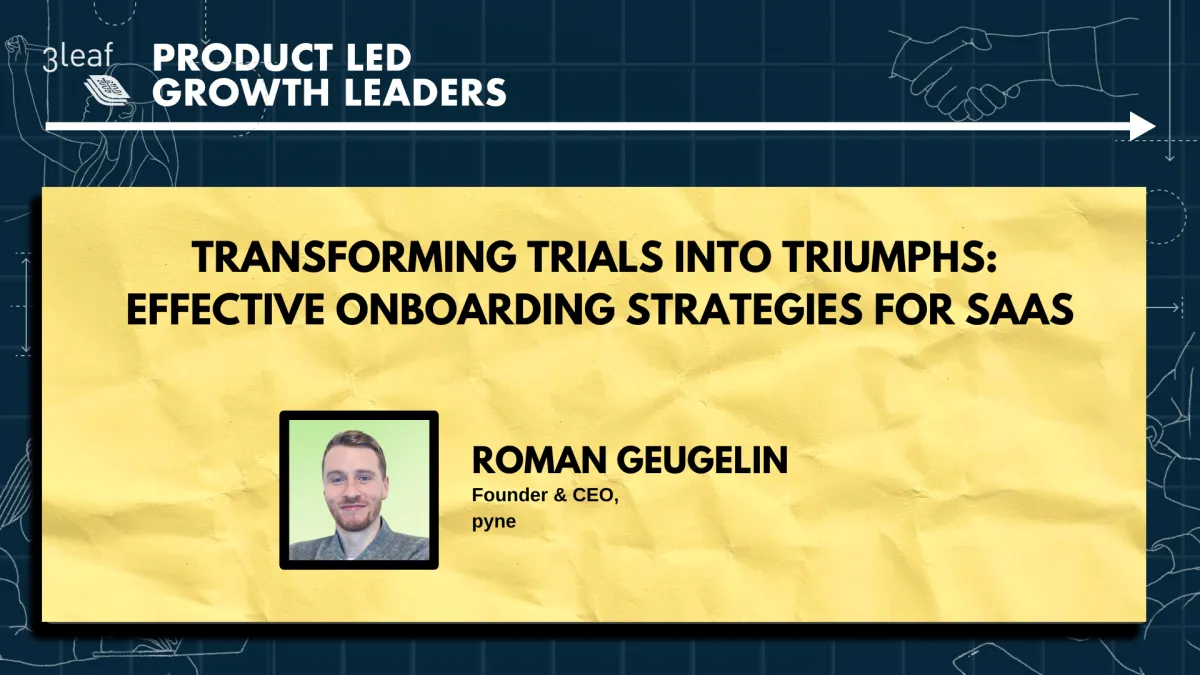Product Led Growth Leaders

94 - Transforming Trials into Triumphs: Effective Onboarding Strategies for SaaS
Mastering User Onboarding in Rapidly Growing SaaS Companies
In the latest episode of Product Led Growth Leaders, host Thomas Watkins engages in a compelling conversation with Roman Geugelin, the founder and CEO of pyne. Pyne specializes in AI-driven in-product demos designed to convert trial users into active customers. The discussion focuses on the challenges of onboarding users in rapidly growing SaaS (Software as a Service) companies, with an emphasis on balancing the scalability of the onboarding process with maintaining a personalized user experience.
Introduction to Roman Geugelin
Roman Geugelin brings a wealth of experience from his previous role as a chief revenue officer and his journey through various companies, especially during phases of rapid growth. He shares insights from his professional background, emphasizing the challenges and lessons learned from hypergrowth, which have informed his current work at pyne.
The Problem of Rapid Growth
Rapid growth can create complications in user onboarding and experience. Often, increasing personnel to assist with onboarding seems like a common solution, but it is not always effective. While hand-holding new users can lead to successful activation, it’s not a scalable approach. Many users enter a product with enthusiasm but can quickly become overwhelmed by the complexity of the interface, leading to confusion and eventual drop-off.
Roman advocates for a Product-Led Growth (PLG) approach, where the product itself facilitates user onboarding and engagement. This strategy is particularly beneficial for SaaS companies targeting small and medium-sized enterprises (SMEs).
Understanding User Drop-Off Points
New users often come into a product with a specific problem they want to solve, and the challenge lies in quickly demonstrating how the product can address that need. Providing a clear and straightforward path to value is crucial. However, when a company’s first user invites additional users, these subsequent users often lack the same motivation and understanding of the product’s value. It’s essential to effectively communicate to ensure that new users engage with the product and understand its value.
For products with many features, users can feel lost and unsure of how to derive value. Simplifying the onboarding experience helps users navigate the product more effectively.
The Role of AI in Onboarding
Roman suggests that AI can redefine PLG by providing automated, personalized guidance to users. AI-driven solutions can scale the hand-holding approach, allowing companies to offer a high-quality onboarding experience to all users. AI can introduce features such as an avatar that greets users and explains the product’s value proposition, guiding them through the product with interactive tours and contextual assistance. Interactive elements like digital assistants allow users to choose their own paths based on their specific needs, enhancing the overall experience.
Launching pyne: The Importance of Design Partners
Roman shares that pyne began by collaborating with design partners who were willing to co-develop the product. Finding partners who believe in the vision and are committed to mutual success is crucial. This collaboration allowed pyne to refine its offering based on real-world feedback, leading to more meaningful solutions.
Early Challenges and Adaptation
Roman reflects on the early challenges of product development. Initially, the results were promising but not universally applicable. The effectiveness of pyne’s solution depended on the context in which it was used, especially in scenarios where users required clear explanations and guidance. Adaptation to customer needs was essential for refining the product to serve a broader audience.
Evolution of pyne's Solution
While the core vision of automating customer success has remained constant, the approach to achieving that vision has evolved. Roman describes how the company experiences cycles of linear and exponential innovation, where small, consistent improvements lead to significant breakthroughs. Staying attuned to customer needs and being willing to adapt the product based on feedback is crucial for ensuring long-term success in a rapidly changing market.
Target Audience for pyne
Roman explains that the most successful companies using pyne are typically Series A and Series B PLG companies with established traction. While smaller companies can benefit from personalized onboarding, they should focus on learning from their users before automating the process. Once a company surpasses a certain threshold of new users per month, it becomes more feasible to implement automated onboarding solutions.
Conclusion
This episode of Product Led Growth Leaders offers valuable insights into the challenges of onboarding in rapidly growing SaaS companies. Roman Geugelin shares his expertise on the importance of scaling the onboarding process while maintaining a personalized experience. He highlights the potential of AI to transform the onboarding landscape, enabling companies to provide high-quality support to all users. Through collaboration with design partners and a commitment to customer success, pyne aims to redefine the onboarding experience and drive product-led growth for its clients.
Link to this episode: https://player.captivate.fm/episode/62df7b0a-9a96-433f-965e-b2d41827eeda/
In case you're curious what we do...
Listen & Subscribe to Product Led Growth Leaders











